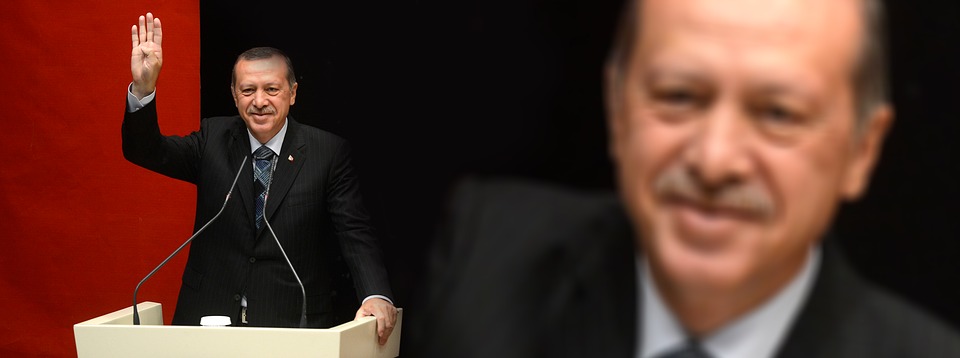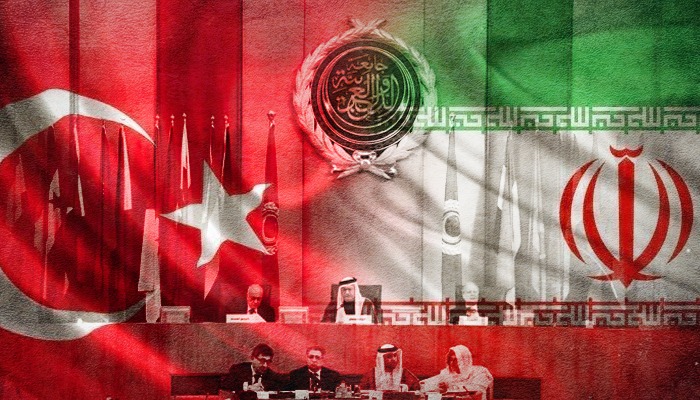The Secretary General of the of the League of Arab States, Ahmed Aboul Gheit, has once again charged Turkey and Iran with expansionism allegedly aimed at spreading their influence to the Arab countries of the Middle East.
As he spoke in Cairo at the opening of an Arab Parliament seminar on “building a unified strategy to deal with neighbors”, Aboul Gheit claimed that Iran and Turkey were carrying out expansionist projects beyond their borders while no one gave them the right to such actions. He surmised along with it that Turkey was advancing political Islam under the guise of neo-Ottoman theories.
It is noteworthy this was far from the first time that the Arab League Secretary General targeted rancorous rhetoric at these two countries. Back in March, he spoke at the first summit of the regional community of Arab countries and the EU in Sharm El Sheikh, Egypt, and mentioned the importance of resolving the Palestinian problem, saying that Turkey and Iran were fomenting crises in the region.
#BREAKING: Arab League Secretary-General Ahmed Aboul Gheit: The interferences of #Iran and #Turkey have exacerbated and prolonged crises in the Arab world. #ArabSummit2019 pic.twitter.com/7XpCxc6NbI
— Saudi Gazette (@Saudi_Gazette) 31. März 2019
“The actions of Iran and Turkey mean the meddling that provokes and kindles crises in the region,” he said. Notably, Iran and Turkey are the main non-Arab states in the Middle East, and the ones that most actively give sustainable material and humanitarian assistance to the citizens of Palestine and speak for an earliest possible settlement of the Palestinian-Israeli conflict.
Nonetheless, Aboul Gheit claimed that Iran and Turkey had turned into a stumbling block for the efforts to attain peace and security in the Middle and to untangle the Palestinian problem.
The Arab League started showing unfriendliness towards Iran as of the moment some of its members changed the stance on the ways of solving the conflict around Palestinian. They developed a more loyal attitude to Israel’s demand for recognizing it as a sovereign state within its incumbent borders. Conversely, the Islamic Republic of Iran occupies a very tough position on the issue. It does not recognize Israel as a sovereign state and regards it as an aggressor and intruder into the Palestinian – and partly Syrian (the Golan Heights) – territories.
In the meantime, the experts polled by the UWI said the root-cause of the Arab League’s hostility towards Iran is bigger than the difference of approaches to the Palestinian problem. It stems from the striving of a third party to use the influential member-states of the League (namely, the Gulf monarchies) as instruments for enfeebling the actors in the international arena, whom it deems to be undesirable.
For instance, Dr. Mani Mehrabi, an Iranian political scientist who is a member of the board of the Institute for Political and International Studies (IrThinktank), believes the U.S. is using the Arab League to step up the pressure on Iran.
“The U.S. uses its Arab allies in the Middle East as it pleases in order wield maximum pressure on Iran,” Dr. Mehrabi said. “Previously, the Americans would use only a lever for pressure in the form of sanctions. Now they have gone over to a different type of pressure that is related to the problem of ‘security and the maintenance of their unbending credo of a global hegemon’. In the first place, the U.S. fears that Iran may build a normal friendly relationship with the Arab League and consolidate its influence on members of this pan-Arab organization. Secondly, the Americans will benefit from triggering a war against Iran with other countries’ hands. The only thing they have to do for it is to set up a coalition bloc of Arab states, which would push Trump towards military actions against Iran. This, in turn, will mean lucrative business, as someone will have an opportunity to sell U.S. armaments worth billions of dollars to the Arab countries warring with Iran, while the monies will flow to the U.S. vaults.”
Ahmad Hashemi, a U.S.-based political analyst who is a postgraduate student at the department of Defense and Strategic Studies, Missouri State University, calls Iran and Turkey the main actors in the Middle East today, adding that they speak out for a revision and changing of the incumbent system in the region, which suits the interests of globalists. Hence the Arab League targets its aggression exactly at the Iranians and the Turks.
“Iran and Turkey are the two revisionist powers today,” Hashemi said.
“They are seeking to do a revision of the order existing in the region now. These two countries speak for a pullout of external forces or, to be more precise, Western powers from the Middle East and for the end of their presence in the Persian Gulf, Syria and other Arab countries. Along with it, a number of Arab League member-states and Israel believe the West with the U.S. in the lead is their main ally and its presence in the Middle East is a matter of paramount importance. Any step made by Iran or Turkey looks irritating for them and hence they try to keep up the quo status. They find any Iranian or Turkish initiative for changing the balance of forces in the region totally unacceptable.
“And standing backstage are the West and Israel that are striving to trigger a contrived conflict between the Arab world and Iran or, in other words, to form a front of some kind for counteraction to Iran and Turkey.”
WHY TURKEY?
Turkey has not had any major conflicts with the leading member-states of the Arab League – and particularly the Gulf monarchies – so far. It has maintained very warm relations with all the countries making up the pan-Arab association. When conflicts between the member-states of the League broke out at various moments in the past, Ankara never took sides, always maintaining neutrality or supporting only the leading members of the organization (the countries of the Gulf Cooperation Council by and large). The only exception occurred in case of Turkey’s position on Palestine in the conflict with Israel and the relations with Iraq that grew sour during Saddam Hussain’s rule. It should be said that Ankara’s unequivocal stance on the problem of ISIS presence in Iraq and Syria brought about the first-ever surge of mistrust and hostility towards Turkey among the Arab League countries.
Secretary general of the Arab League, Ahmed Aboul Gheit revealed that he didn’t understand why Turkey is interfering in Syria. Watch how Turkey’s Foreign Minister Cavusoglu responded pic.twitter.com/z71uU3nud0
— TRT World (@trtworld) 20. Februar 2018
It was Turkey’s stance on settlement of the crisis in Syria and struggle with Isis that played the role of the main lever, which helped change the whole layout of forces in the region. The parties to the conflict in Syria sat down at the table of negotiations eventually thanks to Turkey’s efforts to a big degree. This very fact and Turkey’s alliance with Russia and Iran irritated the forces that had interest in overthrowing Bashar Assad in Syria and financed ISIS for this purposes. Active members of the Arab League were among them.
Dr. Mehrabi says that Turkey managed to influence public opinion in a number of Arab countries with the position of this kind.
“This Turkish influence can be compared to the influence that Iran enjoys among the Shiite population of Arab countries in the Middle East,” he indicates. “Quite naturally, this displeased and enraged some monarchs of the Arab League states. For this reason, they began to shower Recep Tayyip Erdogan with accusations over his alleged desire to revive the Ottoman Empire.”
Dr. Mehrabi notes that Turkey remains the last and most influential player supporting the Moslem Brotherhood movement today.
“For a number of monarchical elites in Arabia – the ones that, unfortunately, sponsored the militants espousing the Wahhabi ideology in Syria and Iraq (Isis) – Turkey’s stance on Moslem Brotherhood and its intention to be on friendly terms with the Shiite Iran is unacceptable. These factors partly cause fear and unbounded wrath among some members of the Arab League,” he said in conclusion.
Ahmad Hashemi agrees that Turkey’s major role in supporting Moslem Brotherhood is one of the many reasons why the Arab League views it as an enemy.
“Some conservative Arab countries have categorized this organization as a terrorist one, while the ideas of Moslem Brotherhood have gained strong popularity in many other Arab states,” he told UWI.
The BBC has recently help a sweeping opinion poll in the Arab countries asking local residents about their preferences for political leaders. President Recep Tayyip Erdogan turned out to be the most popular foreign politician in the Arab world. Turkey’s Justice and Development Party, which supports Erdogan, also appeared to enjoy especial popularity among the citizens of Arab countries, as the principles it promulgates stand closely to the ideas proclaimed by Moslem Brotherhood. The fact of Erdogan’s popularity exasperates the Arabian monarchs who occupy the leading positions in the Arab League.

Ahmad Hashemi stresses one more fact about Turkey that enrages the Arab League. The moderate policy that Ankara conducts in the religious sphere enables it, in a certain measure, to become a leader in the global community of Sunni Moslems. This definitely infuriates Saudi Arabia and Egypt, which claim the role of main guardians of the Sunni world values.
“Also, one cannot help noting a steep rise in Turkey’s prestige in the field of culture and education, and particularly in the segment of multimedia and television, in combination with the soft power policy to this end,” Mr. Hashemi says. “Turkey has won over the hearts of millions of people in the Arab world in this sphere.”
“Last but not least, Turkey’s position on Palestine and especially its good relations with the leaders of Fatah and Hamas make a number of member-states of the Arab League furious,” he says.
The hair-raising murder of the Saudi national Jamal Khashoggi in Saudi Arabia’s Consulate General in Istanbul obviously became the biggest high-profile incident that spoiled the relations between Turkey and Saudi Arabia. The data and materials released by Turkish secret services fully undermined the political goodwill of Saudi Crown Prince Mohammad bin Salman and the people from his inner circle. The prince found it impossible to pardon the Turkish authorities for this. That is why no one can rule out that he will use any pretexts and international organizations for revenge in the political arena against the Turkish leader who rendered his image to naught.

















Leave a Reply